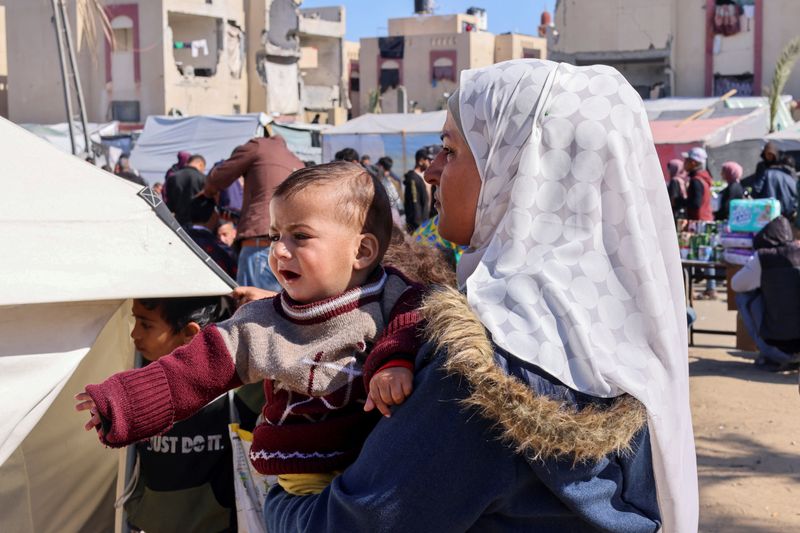
©Reuters. A displaced Palestinian woman holds her son as she waits to have him examined by a doctor, outside a medical tent, amid the ongoing conflict between Israel and Hamas, in Rafah, southern Gaza Strip, February 11, 2024. REUTERS / Saleh Salem
2/5
By Mohammad Salem and Nidal al-Mughrabi
RAFAH, Gaza Strip/DOHA (Reuters) – The Abu Mustafa family’s tent collides with the high metal and concrete fence separating Gaza from Egypt in Rafah, the last relatively safe place in an enclave devastated by Israeli military offensive, but they could now also be attacked.
The family is among more than a million Palestinians now crammed into the area around Rafah who fear they have nowhere left to flee within a small strip largely reduced to rubble and where fighting still rages.
“Every day we are on the run. Being displaced is difficult because I have two daughters with disabilities. I can’t take them around. I don’t have a car or a cart,” said Laila Abu Mustafa.
“If there are more displacements, I will not move,” he said.
Israeli Prime Minister Benjamin Netanyahu has ordered an evacuation plan for civilians crowding Rafah, camping in streets and empty lots, on beaches and, like the Abu Mustafa family, on the sandy strip along the Egyptian border.
Humanitarian agencies say any attack on the city will be catastrophic in a war that has already caused untold suffering.
The war began on October 7, when the Hamas militant group that controls Gaza stormed the border fence with Israel, sending in fighters who killed 1,200 people, mostly civilians, and seized about 250 hostages, according to counts Israelis.
Four months later, Gaza is in ruins. Under massive daily bombardment, Israeli ground forces have overrun much of the enclave, destroying homes, public buildings and infrastructure with airstrikes, artillery fire and controlled detonations.
Palestinian health authorities say more than 28,000 people have been killed in the war, about 70 percent of them women and children. Over 85% of Gazans are homeless. A United Nations survey found that nearly one in ten children under five is severely malnourished.
Negotiations for a ceasefire and the release of hostages have so far failed to reach an agreement. Last week, Israel rejected a Hamas proposal, saying it would not stop fighting as long as the group maintained the brigades that Israel says are hiding in Rafah.
Egyptian security sources said further high-level talks were scheduled for Tuesday with the participation of senior officials from Qatar and the United States, as well as Israeli and Palestinian delegations.
In recent days, Israeli airstrikes have begun targeting Rafah.
On Sunday, Hamas said Israeli airstrikes in the Gaza Strip over the previous four days had killed two hostages and wounded eight others.
The group said any Israeli attack on Rafah would “scupper” discussions on a deal to free the remaining hostages.
CIVIL EVACUATION PLAN
Speaking in an interview to be broadcast on Sunday on the US ABC network, Netanyahu reiterated that Israeli forces would attack Rafah but said they were preparing “a detailed plan” for where civilians could go.
“We will do it. We will bring the remaining Hamas terrorist battalions to Rafah,” he said, adding “we will do this by ensuring safe passage for the civilian population.”
A spokesperson for the French Foreign Ministry said that “a large-scale Israeli offensive in Rafah would create a catastrophic humanitarian situation of a new and unjustifiable dimension.”
Against the border fence, topped with barbed wire, the Abu Mustafa family hangs out their laundry between their tents. They cook what little food they can scavenge in empty tin cans over a fire in the sand.
Fear of an attack in Rafah is the constant topic of every conversation in the crowded city, said Mariam, a woman who fled her Gaza City home at the start of the war with her three children, ages 5, 7 and 9. years.
“I can’t describe how we feel. There is turmoil in my head. My children keep asking me when Israel will invade Rafah and where we will go and if we will die. And I don’t have the answers,” he said. .